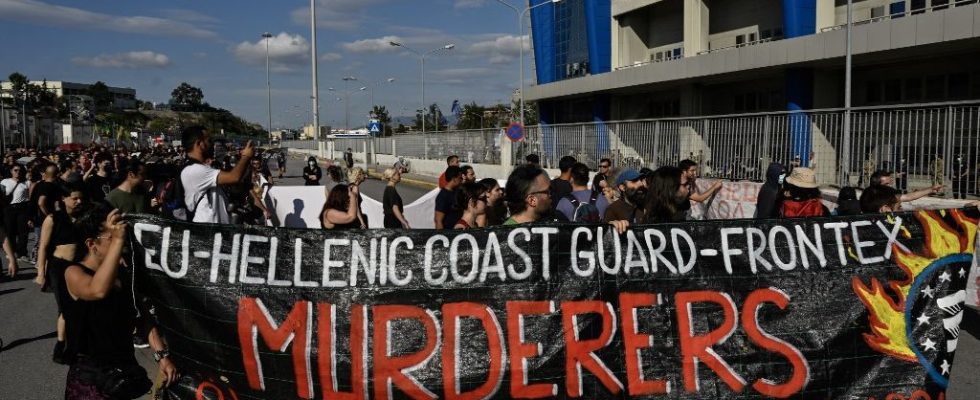Two weeks after the sinking of a migrant boat off the coast of Greece which left hundreds missing, five survivors, met by AFP near Athens, accuse the coastguards of having lacked the will to save. Since the tragedy, the Greek government, on the contrary, places the sole responsibility on the networks of smugglers. “The real responsibility lies with the criminal gangs who filled the boat with desperate people (…) without even giving them life jackets,” Greek Prime Minister Kyriakos Mitsotakis said Thursday in Brussels.
Away from the Greek police who scrupulously control access to the Malakasa refugee camp, north of Athens, Hassan, a 26-year-old Syrian refugee, does not hide his anger towards the coastguards, whose slowness to intervene , on June 14, was denounced by NGOs and the media. “I didn’t have the impression at all that the Greek coast guard wanted to save us,” he laments. He is one of the 104 men, including many Syrians, rescued by the coastguards after the sinking of the fishing boat.
At least 82 dead, hundreds missing
According to their testimonies, between 600 and 750 passengers were on board, including women and children in the hold of the boat, who could not be saved. “I don’t know exactly how many there were, but we heard their cries, their cries,” recalls Ahmad, a 27-year-old Syrian. At least 82 people drowned and hundreds more disappeared when this trawler that left Libya bound for Italy capsized on June 14 before sinking in 15 minutes 47 nautical miles from Pylos (south).
This sinking raised many questions about the responsibilities of the Greek authorities. The coastguard only revealed the conditions of the sinking in dribs and drabs. A judicial inquiry into the causes of this tragedy has been opened in Greece. On Monday, the European Borders Agency said Athens had ignored an offer of additional air support from Frontex.
“It was no accident! »
According to the five survivors interviewed, ropes were thrown by the coastguards, twice, towards their boat in distress to tow them. The first time, the rope let go. The second time, “the rope was tied in front by the military boat which suddenly zigzagged very quickly, producing waves. That’s when the boat capsized,” says Salim, a 28-year-old Syrian. This exile, who out of fear for his safety requested anonymity, like the others, goes so far as to accuse the coast guards of having acted on purpose: “It was not an accident! “.
At around two in the morning on June 14, Salim jumped into the water after the trawler capsized. He still has his steamy watch on his wrist. “For at least 10 minutes, the coastguard watched us from afar before sending two inflatable boats to help us,” he continues, tears in his eyes. According to the Greek government, “the coastguards had also approached the boat, they threw a rope to stabilize it, but the migrants refused help”. Asked by AFP about the progress of the operation carried out by the coastguards, the Ministry of the Navy said that “these questions are part of the investigation carried out which takes place in strict confidentiality”.
According to the Council for Refugees (GCR) between 35 and 40 survivors recounted the same events concerning the coast guard towing the boat with a cable. “Why did they tow the boat? We have to wait for the results of the investigation”, notes Lefteris Papagiannakis, director of the GCR noting however a flagrant delay in the rescue operation.

